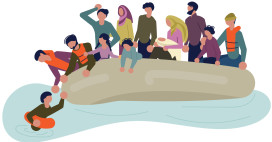
On this page
The European Impacted Persons Advisory Council (EIPAC) is an advisory committee composed of people with lived experience in various aspects of the criminal legal system who are committed to supporting the reform of the system. Formed in 2024 as an advisory body to Fair Trials Europe, EIPAC ensures that the voices of impacted persons shape policies, campaigns, and the Fair Trials advocacy efforts. This is “EIPAC Voices: Stories of Lived Experience in Justice Reform” a monthly blog series, introducing EIPAC members and their personal experiences.
On February 9, 1965, just 12 days before he was assassinated, Malcolm X was stopped at Orly airport in Paris and deported from France. Malcolm was supposed to deliver a speech in Paris that, according to the French government, would disturb the public order. Not in a lifetime would I have imagined that, 58 years later, I would also be stopped at the same Paris airport for similar reasons and deported to my home country, Belgium.
In December 2022, I landed at Paris Orly. There, I was stopped and informed by the Border Police that a powerful French political figure had issued an administrative ban barring me from entering French territory. The expulsion order was justified not only by my written critiques of him and his discriminatory policies, but also by an article in which I had allegedly “rewritten history” by claiming that West African Muslims discovered America before Christopher Columbus—an accusation to which I later pleaded guilty, as the article drew upon research by a Harvard professor and other American scholars.
I was then taken to a deportation center alongside some twenty African refugees, all awaiting forced expulsion. We began talking, asking each other where we were being deported to. Most were being sent to Mali, Niger, Ghana, Senegal, or Côte d’Ivoire. When I said I was being deported to Belgium, no one believed me, they thought I was joking.
“How can this terrorist be deported from France and be allowed into Spain?”
The next day, I was forcibly deported to Brussels, but via Madrid, since there were no direct flights and I was not allowed to enter France to catch a train. Before boarding the plane, one of the officers handed my passport to the pilot and instructed him to return it to me upon landing in Madrid. The pilot objected: “I can’t just hand him back his passport. I’ll wait for your colleagues to pick him up.” The officer replied that no one would be meeting me at Barajas Airport. The discussion continued for several minutes. As the pilot stepped back onto the plane with my passport, he looked utterly dumbfounded, probably thinking: “How can this terrorist be deported from France and be allowed into Spain?”.
I, of course, was not a terrorist, and the barring of entering France, was a personal vendetta from a high-level French politician who claimed that I was a threat to the country. So how did all this craziness begin?
It was 2019, and I was working as an interpreter for the Belgian Ministry of the Interior. One day, out of the blue, my superior informed me that my security clearance had been revoked by the Belgian State Security. A three-page deprecatory intelligence report had been issued, stating that, due to my critical articles against structural racism, I was a “dangerous” radical, unsuitable to work for a state institution such as the Ministry. My work permit was revoked on the spot.
“Why is State Security so keen on getting you?” This was the question posed by the three expert judges on the day of my appeal court hearing. I replied that I suspected the involvement of the French authorities. Many of my articles focused on France, and the French government has shown little tolerance for criticism of its anti-Muslim policies. One of the judges stated that foreign interference in the case could not be tolerated, and he summoned the author of the intelligence report.
A few months later, the State Security analyst appeared before the same three judges and flatly denied any contact with the French intelligence services regarding my case. But later, as promised during his hearing, he again submitted an eight-page document intended to prove that I was a radical. However, the document was nothing more than a defamatory personal critique based on misinterpretations of my writings. Finally, after a year of judicial procedures, the judges cleared my name and reinstated my security clearance. I was fortunate to stand before three principled judges who remained anchored in the facts and upheld both Belgian and international law. They ruled that my articles were part of my fundamental right to freedom of expression.
The day after my legal victory, I received an email from my superior at the Ministry of the Interior, acknowledging the outcome of my case and inviting me to return to work. In the following months, I was appointed as a legal interpreter for the Ministry of Justice and began teaching interpretation skills at the Belgian Ministry of Public Health.
But my legal problems with the French judicial system just began.
The Oppressive Power of the State
Eight days after my victory, I received an intimidating call from the French judicial police. A high-ranking French government official had filed a libel lawsuit against me. Once again, it concerned a critique I had written, this time, of his latest book. During the call, the officer demanded I appear before a French judge. This was unlawful: as a Belgian citizen residing in Belgium, I should not be directly summoned in a foreign country. After that call, it became clear to me that what occurred in Belgium was part of an effort of the French government to silence my voice.
Nearly a year later after the unlawful detention at Orly, in October 2023, I successfully appealed the ban through a French court and regained the right to enter France. As in Belgium, the judge recognised that my writings fell within the bounds of my constitutionally protected right to freedom of expression.
My lawyers were shocked by the ruling: under EU law, EU citizens cannot be banned from entering other member states simply for publishing critical articles. But I was.
But this win did not last very long. The high-ranking French government official swiftly appealed the ruling, this time shifting the accusation from libel against the French state to me being a security threat who, as it was claimed, could disturb public order. By resorting to this manoeuvre, this powerful politician secured a win at the Paris Court of Appeal. My lawyers were shocked by the ruling: under EU law, EU citizens cannot be banned from entering other member states simply for publishing critical articles. But I was. I have once again filed an appeal and am currently awaiting a hearing before the French Council of State. However, every legal counsel I have spoken with agrees that, due to the senior position this person holds within the French government, it is practically impossible for me to win this case in France. I will likely have to take it to the European Court of Human Rights. Several lawyers have told me that, in past trials, they witnessed government officials exert pressure on judges, warning: “If you do not rule in our favour and the defendant commits a criminal act, you will bear full responsibility.” This is one of the reasons why French judges now almost systematically rule in favour of this individual, especially when the defendant is a Muslim accused of extremism or radicalism.
Amplifying the Unique Experiences of Victims of State Repression
My case has garnered media attention and is currently being reviewed by Amnesty International, as well as by several journalists and researchers who have highlighted the broader implications of state security abuses in France and Belgium. To date, my initial job loss and the resulting legal fines have cost me over 43 000 €. Although I didn’t undergo a formal series of SLAPPs (Strategic Lawsuits Against Public Participation), the French government has used every tool at its disposal to silence my voice, and that of many other critical voices (journalists, researchers, activists…), by any means possible.
Over the years I’ve been fighting my case, France’s political climate has drastically deteriorated with increasingly restrictive migration policies, a rise in anti-Muslim sentiment, and the mainstreaming and implementation of far-right ideologies by the current government. Judges are the final guardians of the rule of law in the face of state repression, structural racism, and discriminatory policies. When the judiciary becomes compromised, fair trials collapsed into mere facades of justice, and the erosion of fundamental rights begins, first for minorities, and inevitably extending to the majority as well.
Today, my legal battle has not only deepened my commitment to advocating for justice but has also provided me with a profound understanding of the systemic disparities and abuses that marginalized communities face within the legal system.
As a Fair Trials consultant and member of the European Impacted Persons Advisory Council, I am committed to amplifying the unique real-world experiences of victims of state repression, individuals whose voices have been systematically silenced and marginalized. Undoubtedly, sharing the insights of those most affected by systemic disparities will contribute to Fair Trials’ mission of advocating for fairness and equal treatment within the criminal justice systems and beyond.
Author: Karim X
Article edited by: Ángela Rodríguez, Fair Trials’ Communications Officer.
As part of our commitment to centering impacted voices, Fair Trials will feature a monthly blog series, “EIPAC Voices: Stories of Lived Experience in Justice Reform,” introducing EIPAC members and their personal experiences. These stories highlight the human cost of justice system failures while reinforcing the need for fairer, more rights-based approaches to justice.


